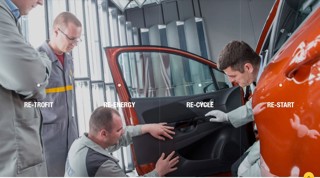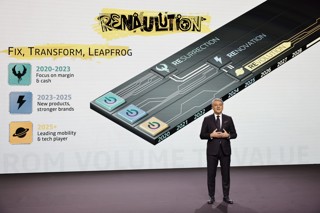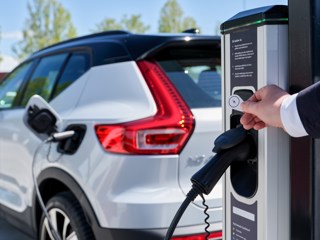Renault has sold its 1.5% share in Mercedes-Benz carmaker Daimler for 1.143 billion euros (£0.98bn) as its looks to reduce debt and leverage profits.
The French car manufacturer revealed in a statement issued this morning (March 12) that it had completed the successful sale of its entire stake in Daimler AG – amounting to 16,448,378 shares – through a placement to qualified investors.
It added: “The proceeds of this sale will allow the Renault Group to accelerate the financial deleveraging of its Automotive activity.
Renault has sold its 1.5% share in Mercedes-Benz carmaker Daimler for 1.143 billion euros (£0.98bn) as its looks to reduce debt and leverage profits.
The French car manufacturer revealed in a statement issued this morning (March 12) that it had completed the successful sale of its entire stake in Daimler AG – amounting to 16,448,378 shares – through a placement to qualified investors.
It added: “The proceeds of this sale will allow the Renault Group to accelerate the financial deleveraging of its Automotive activity.
“The industrial partnership between the Renault Group and Daimler remains unchanged and is not impacted by this financial transaction.”
Renault and Daimler’s cross-shareholding and partnership originated in 2010 under then-CEOs Carlos Ghosn and Dieter Zetsche and brought about collaboration on smart and Twingo hatchbacks.
Bloomberg reported that Renault’s shares sales had been timely, with Daimler shares having surged in value since the Mercedes-Benz maker announced plans to spin off its truck unit last month.
It also comes after Mercedes-Benz announced its plan to move further upmarket, signalling apossible divergence in the two OEMs' paths.
The funds will serve Renault well at a time when it is making a push into electric vehicles (EV) at the same time as targeting cost savings and increased profitability.
At its “Renaulution” strategy event last month, new CEO Luca De Meo revealed the OEM’s plan to halve its number of vehicle platforms from six to three and reduce its manufacturing capacity from its current four million (2019) to 3.1 million by 2025 as part of measures targeting a €600 saving on the cost of producing each of its vehicles.
de Meo said that, at the heart of the business’ new direction was a plan to shift its positioning from being “a car company working with tech to a tech company working with cars, making at least 20% of its revenues from services, data and energy trading by 2030”.
By 2023, Groupe Renault is targeting a group operating margin of 3%, about €3bn of cumulative automotive operational free cash flow and lower investments to about 8% of revenues.
In the following two years it will target a group operating margin of at least 5%, it said, about €6bn of cumulative automotive operational free cash flow and a ROCE improvement by at least 15 points compared to 2019.
Login to continue reading
Or register with AM-online to keep up to date with the latest UK automotive retail industry news and insight.


















Login to comment
Comments
No comments have been made yet.